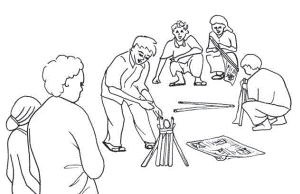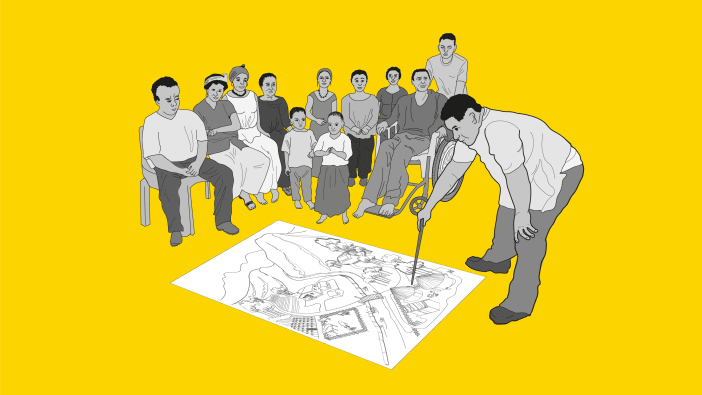Before the exercise, speak to the leaders of each of the three groups to tell them how they should lead. Try to make sure no one else knows this is happening. One of the leaders will tell the group what to do, one will let the group get on with the task and one will include everyone's ideas.
Authoritarian - 'the ruler'
An authoritarian leader gives orders and directions which others follow.
Laissez-faire - 'the one who lets them get on with it'
A leader with a laissez-faire style allows the group to do whatever seems best to them while watching what is happening.
Facilitative - 'the one who includes everyone's ideas'
A facilitative leader encourages everyone in the group to take part in deciding what to do. She or he does not give the answers but helps the group to find an answer together.
Experiences of the different groups
These are some common experiences that you may see in the groups:
- The group led by 'the ruler' quite often finishes the challenge first. However, the group members are frustrated that they cannot try any of their own ideas but must simply do what the leader says. They only win the challenge if the leader's idea was an especially good one, because other ideas are not included.
- The group led by 'the one who lets them get on with it' does not usually win because it is not obvious how the group should work together. Sometimes someone in the group other than the appointed leader takes over and leads the group instead.
- The group led by 'the one who includes everyone's ideas' takes longer to find a solution to the challenge. When the group finishes the people are often very happy - even cheering and congratulating one another - because their success is shared.
When the challenge is completed, ask the leaders to explain their approach to their group. Then, ask the groups to discuss what they liked and did not like about the style of leadership the leader was using. Then ask one member from each of the groups in turn to share the group's opinions with everyone.
Note: if you do not have paper and sticky tape, you could use other materials such as a piece of cloth, sticks and string. You can adapt the challenge - it need not involve an egg at all. The main thing is that it should be a fun and practical challenge, but quite difficult.
Tulo Raistrick is Tearfund's Church and Development Advisor. With thanks to Jim Hartley.
Imagine...
- You are a leader who has just made an important decision. As you had responsibility for the decision, you made it on your own. Someone has just come and told you some important information that you did not know because you did not ask anyone any questions before you made the decision. As a result you now know that you have made the wrong decision. What do you do?
- You lead a group of young people in your community that is successful and growing. You listen to the young people and include their ideas in your activities. Someone you respect has told you that you need to 'lay down the law' when you lead because he has noticed that the meetings can be noisy. What do you do?










